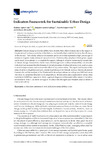Indicators Framework for Sustainable Urban Design

Use este enlace para citar
http://hdl.handle.net/2183/26930Coleccións
- GI-GIRAP - Artigos [53]
- GI-RNASA - Artigos [195]
Metadatos
Mostrar o rexistro completo do ítemTítulo
Indicators Framework for Sustainable Urban DesignData
2020Cita bibliográfica
López Chao, Andrea, Amparo Casares Gallego, Vicente Lopez-Chao, and Alberto Alvarellos. “Indicators Framework for Sustainable Urban Design.” Atmosphere 11, no. 11 (October 22, 2020): 1143. doi:10.3390/atmos11111143.
Resumo
[Abstract] Climate change and sustainability have recently been object of study due to the impact on the planet and on human activity of the first and the benefits that could derive from the efficiency of the second. Particularly, urban environments are locations that represent a high percentage of emissions of gases, waste, resources use and so forth. However, they are places where great changes can be made, in an attempt to accomplish the urgent challenge to adapt to current and projected rates of climate change. Research has shown that a fruitful approach to urban sustainability is to describe indicators that measure the effectiveness of current processes of urban infrastructures, analyze areas in need of improvement and measure the effect of any actions taken. The significant feature of this research relies on its global approach, considering both major worldwide used and less widely-spread frameworks and the analysis of the 32 selected tools and guidelines, including over 2000 indicators. The result is a proposed structure of 14 categories and 48 indicators, easily applicable in urban areas, that tries to fulfill basic aspects to obtain a general diagnosis of the sustainable nature of the urban environment, which can serve as support to detect the strongest and weakest areas in terms of their sustainability.
Palabras chave
Architecture
Assessment
Tool
Indicators
Sustainability
Cities
Assessment
Tool
Indicators
Sustainability
Cities
Versión do editor
Dereitos
Atribución 4.0






